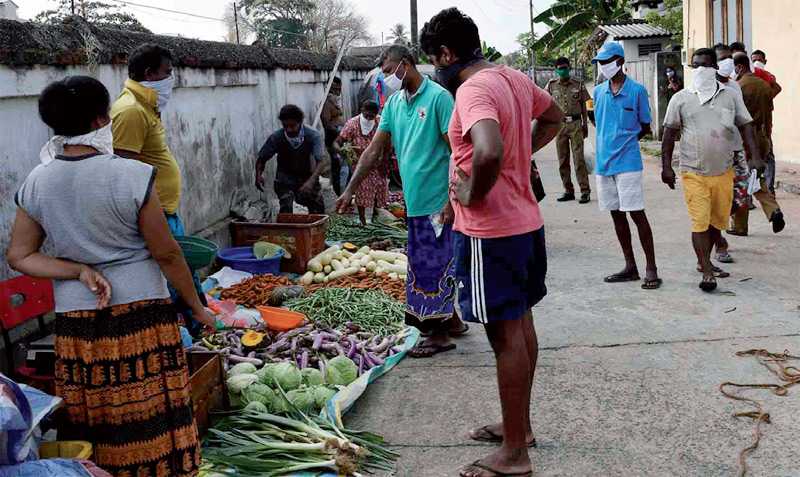Tuesday Feb 17, 2026
Tuesday Feb 17, 2026
Friday, 25 December 2020 00:00 - - {{hitsCtrl.values.hits}}

The contribution of small entrepreneurs to the economy and the growth of the economy cannot be ignored – Pic by Shehan Gunasekara
 Now we can see many Sri Lankans start to talk about import substitution with more focus on local production. It can be seen in Budget proposal for 2021, which also promoted import substitution with some suggestions for the year 2021.
Now we can see many Sri Lankans start to talk about import substitution with more focus on local production. It can be seen in Budget proposal for 2021, which also promoted import substitution with some suggestions for the year 2021.
Furthermore, we can witness some workshops, seminars, and events for the SME sector being conducted in this time of the COVID-19 pandemic. Interestingly by last month, the Asian Development Bank (ADB) has approved a $ 165 million loan to Sri Lanka to provide funding for small and medium-enterprises (SMEs), which have been severely affected by COVID-19 and long-term financing to underserved SMEs, including businesses led by women and tea smallholders.
Role of SME
Small businesses play a huge role in the development of any country. The contribution of small entrepreneurs to the economy and the growth of the economy cannot be ignored. For example, in the United States, about 70% of new job creation is done by small businesses, and it should be noted that small businesses in that country contribute 13 times as many patents to the world than other businesses. This is same in Sri Lanka as well. The SME sector in Sri Lanka is contributing to 45% of total employment and 52% of the gross domestic product of the country. There is a need to explore more opportunities in this sector and in that context, research plays a really important role.
Research for family-oriented-SME
Anyway, Sri Lanka is spending only less than 0.15% of total GDP for research and development and there is an essential requirement to increase this amount as national policy. And also, by looking at most of the studies done in Sri Lanka on SMEs, it can be observed that there is a need to focus more on ‘Family Business orientation’ as it is embedded in our culture. In this scenario, the entrepreneurial behaviour, attributes and characteristics of a family business can be seen as different from other businesses.
I was really fortunate to have a discussion on same with one of the best scholars in Sri Lanka on family business research, Professor Pradeep Dharmadasa, attached to Department of International Business, Faculty of Management and Finance, University of Colombo. He has explained the need to have an extensive discussion on the society (to conduct more research, seminars and workshops, etc.) on the family business in Sri Lanka and how most of the countries in the globe have done some studies with more practical implications.
Professor Dharmadasa has done his Ph.D. Study in the Faculty of Business, Technology and Sustainable Development, Bond University, Queensland, Australia. His title of the study was ‘Organisational Learning, Innovation and Performance in Family-Controlled Manufacturing Small and Medium-Sized Enterprises (SMEs) in Australia’. And more importantly one of his research outcomes was that ‘the effect of formal planning and innovation on firm performance of family, SMEs were stronger than for non-family SMEs’. Hence there is a need to conduct a replicate study in Sri Lanka to study our context as well.
In this backdrop Dr. Seuwandhi B. Ranasinghe, Senior Lecturer attached to Department of Management Organisation Studies, Faculty of Management and Finance, University of Colombo together with Buddhika Hewawasam (Deputy General Manager – Sri Lankan Aviation College) and Dr. Yashoda S. Bandara (Senior Lecturer, Department of Business Management, Faculty of Management Studies, Rajarata University of Sri Lanka), has introduced a new module called ‘Indigenous Management in Sri Lanka’ for the MBA conducted by Faculty of Management and Finance, University of Colombo. We can see many positives in COVID-19 as many academics in Sri Lanka leading many areas of studies with scholarly value with practical implications.
Conclusion
COVID-19 has created the strategic window opened for Sri Lanka in which opportunities have been created in both local and global markets. There is a need to have proactive measurement to exploit the opportunities in the market. As explained earlier the SME sector is really important and many scholars are willing to assist with this in terms of research and there is a need for better collaborations between industry and Government sector to reap this opportunity.
(The writer is Professor in Management Studies, Open University of Sri Lanka and can be reached on [email protected].)